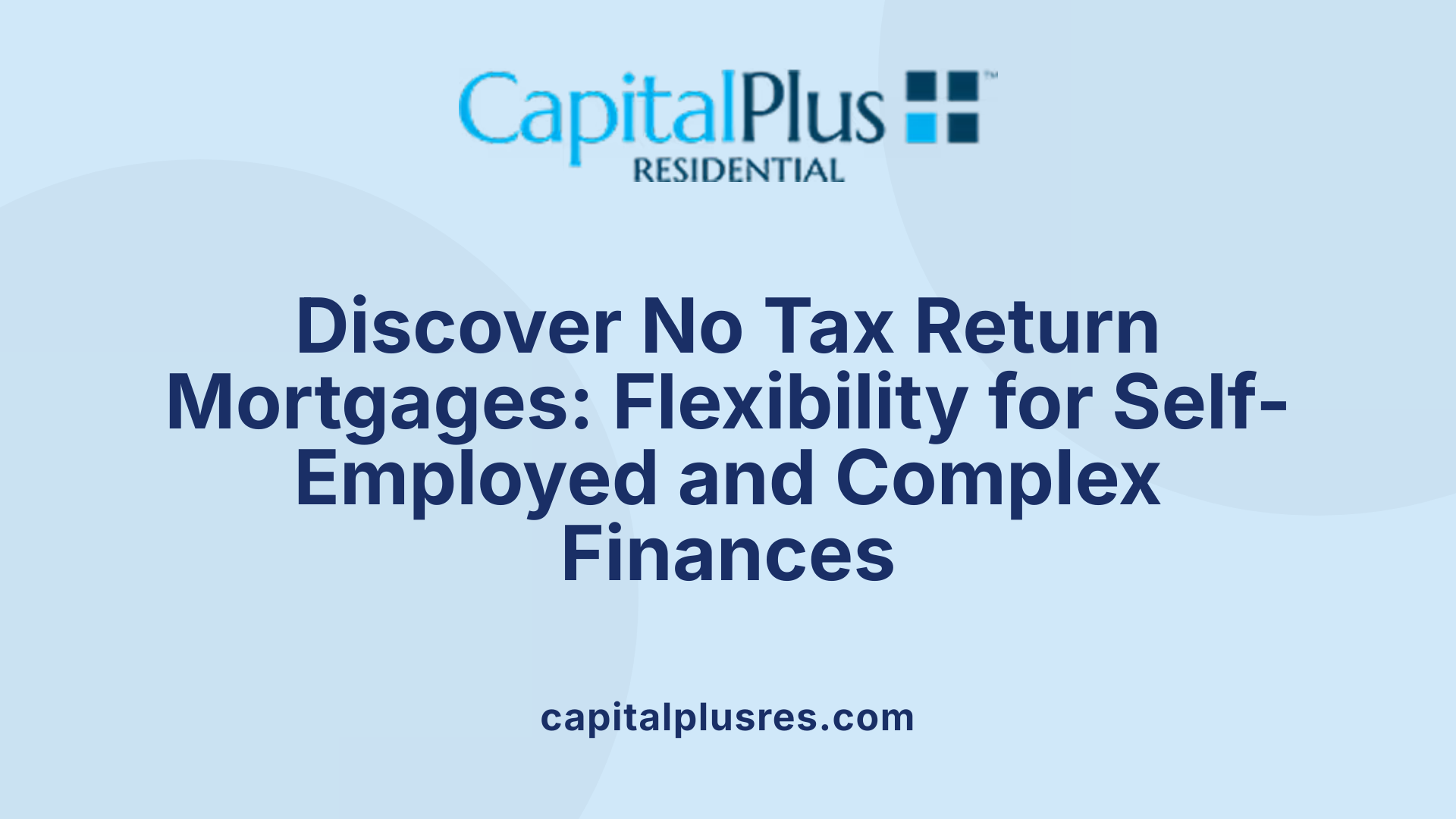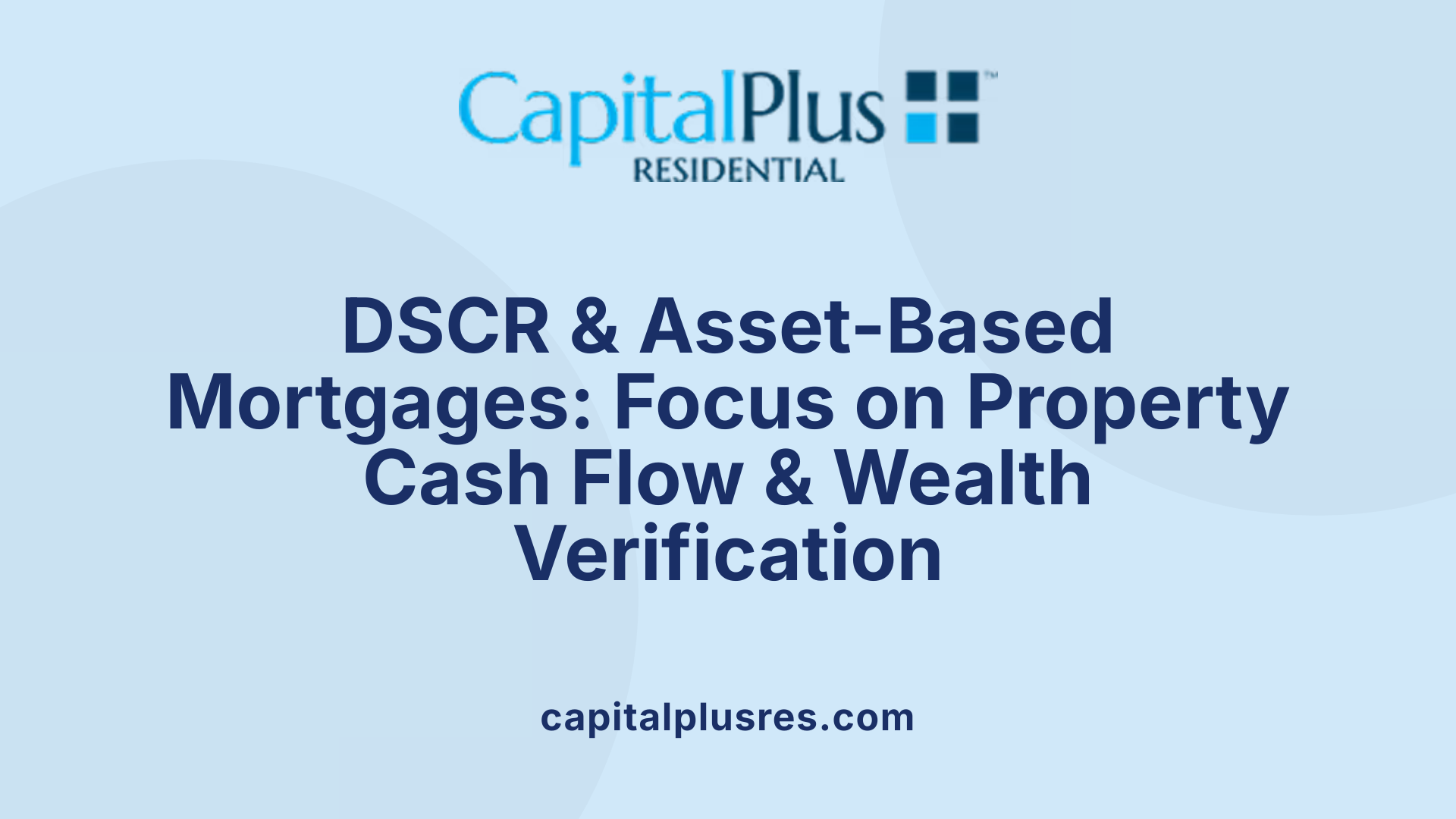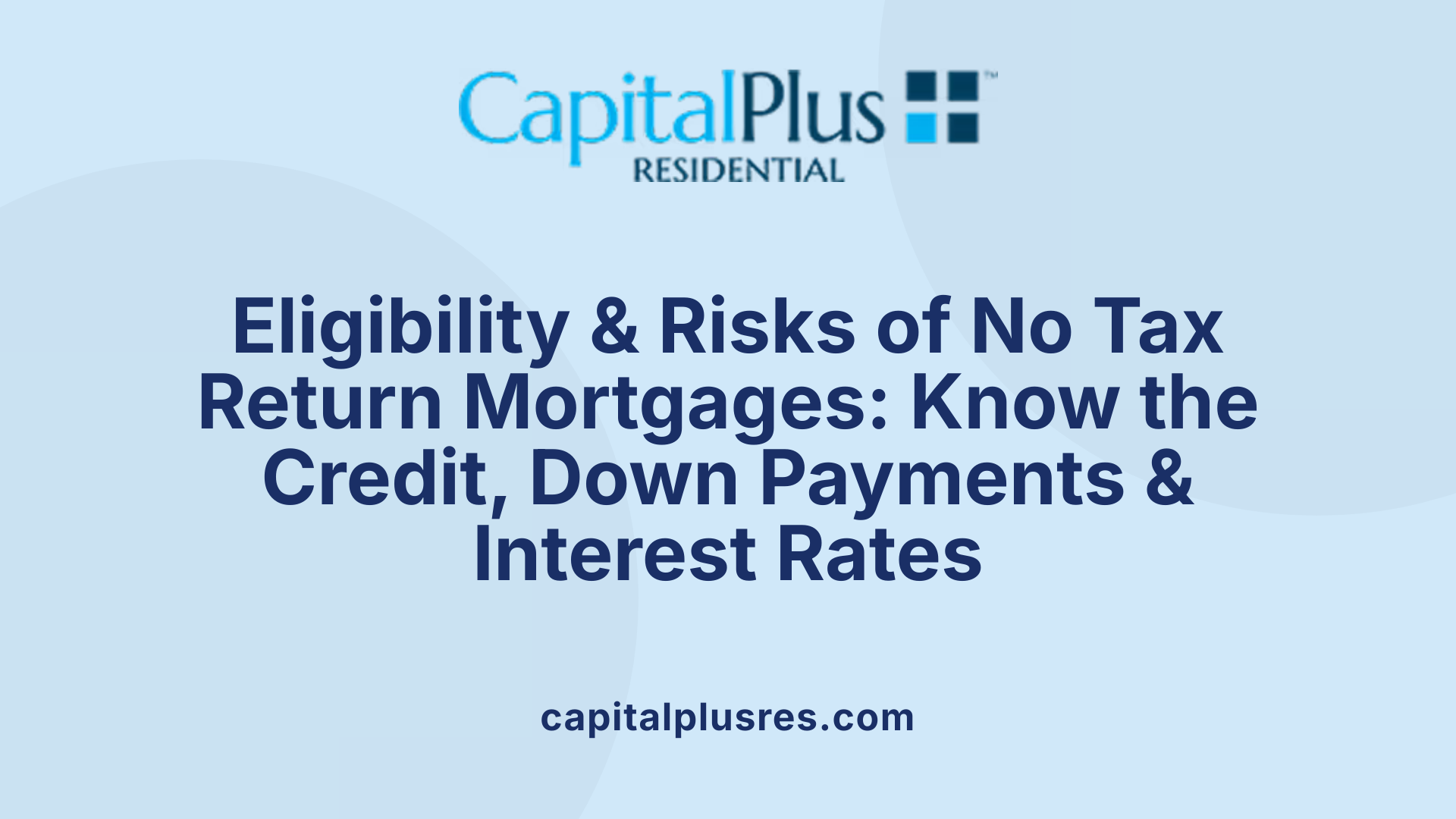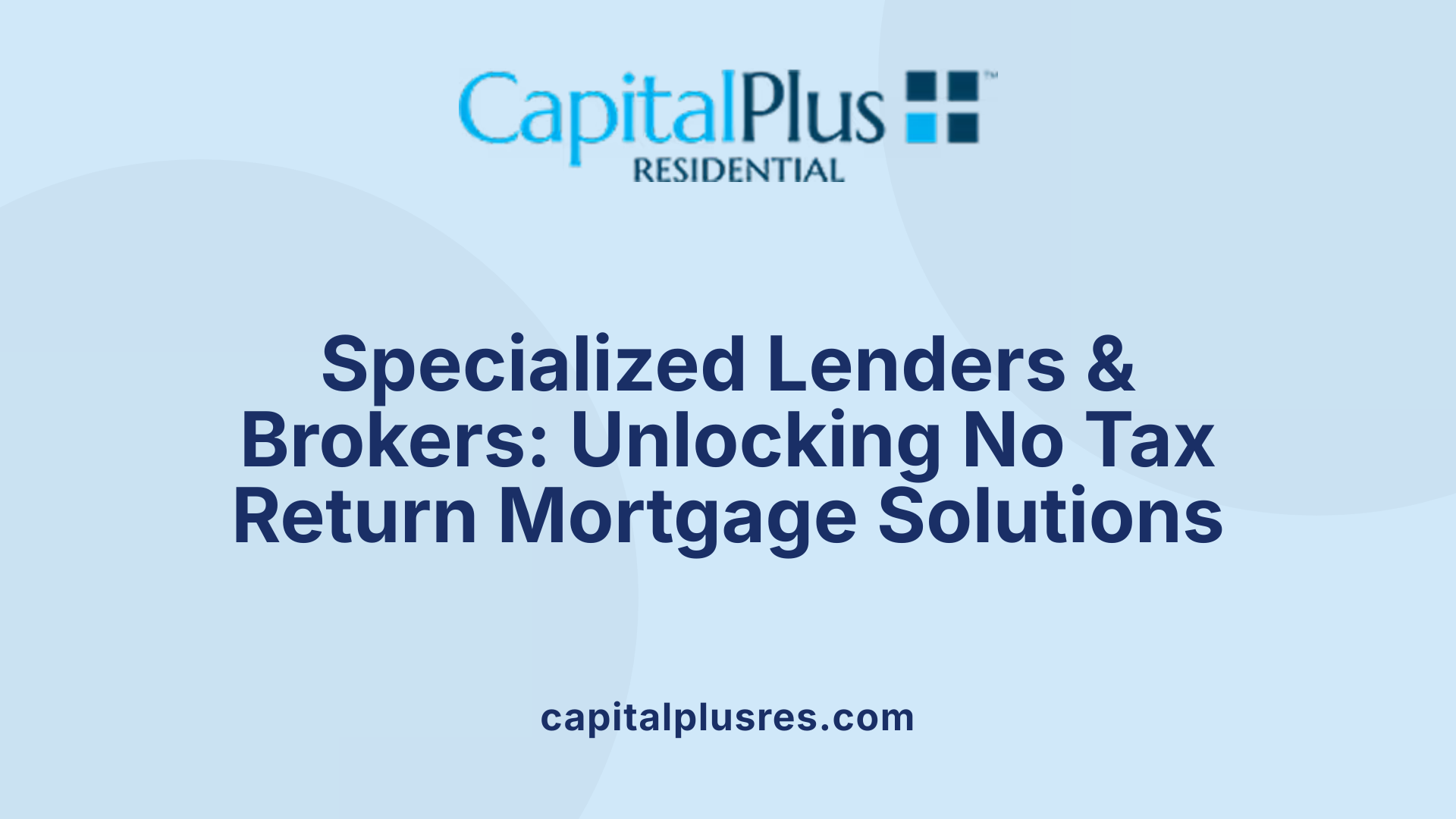Navigating Mortgage Options Without Tax Returns
Traditional mortgage applications often require extensive financial documentation, including tax returns, W-2s, and pay stubs. However, many borrowers, particularly the self-employed, investors, and those with complex financial situations, may find these requirements challenging or unrepresentative of their income. This article explores various mortgage options available without needing tax returns, highlighting how alternative income verification methods and specialized loan products offer flexibility and accessibility in today's lending environment.
What Are No Tax Return Mortgages?

What is a no tax return mortgage?
A no tax return mortgage is a mortgage loan option that does not require borrowers to submit traditional tax returns for income verification. Instead, lenders accept alternative documentation such as bank statements, profit and loss statements, or asset verification. This approach enables individuals, particularly self-employed borrowers or those with complex finances, to qualify without standard tax paperwork.
How do no-doc mortgages differ from traditional loans?
No-doc or no-income verification mortgages differ from traditional loans by minimizing or eliminating the need for traditional income documentation like pay stubs or W-2 forms. These loans place more emphasis on factors such as credit scores, assets, and property equity. By using these alternative verification methods, lenders assess borrower creditworthiness differently, often streamlining the approval process.
What are the documentation alternatives commonly required?
Common alternatives to tax returns include:
- Bank statements showing cash flow over 12 to 24 months
- Profit and loss statements for self-employed individuals
- Asset verification such as savings, stocks, or bonds These options offer flexibility for borrowers whose income may fluctuate or who do not have traditional payroll documentation.
What led to the increased regulation of no-doc mortgages?
No-doc mortgage misuse contributed to the 2007-2008 financial crisis by enabling risky lending without sufficient borrower verification. In response, regulations became stricter, reducing the availability of true no-doc loans. Modern no-doc options are now more limited, usually targeting real estate investors and high-net-worth individuals, and require higher credit scores, larger down payments, and often higher interest rates. This regulatory shift has made non-traditional mortgages more specialized products today.
Alternative Documentation Methods: Bank Statement and Profit and Loss Loans

How do bank statement loans work?
Bank statement loans enable borrowers, especially self-employed individuals with variable income, to qualify for mortgages by analyzing their bank statements over the past 12 or 24 months. This method sidesteps the need for traditional tax returns, leveraging actual cash flow reflected in checking and savings accounts to demonstrate financial stability.
What role do profit and loss statements play in mortgage qualification?
Profit and loss (P&L) statement loans allow borrowers to use their business's P&L reports from the previous one or two years as income verification. These statements offer a clear picture of business profitability and, when combined with bank statements, are particularly beneficial for self-employed individuals with steady revenue streams.
Verification periods and eligibility requirements
Borrowers can qualify using 12 or 24 months of bank statements. Eligibility often requires a minimum credit score of 640-720 and permissible loan-to-value ratios vary, such as up to 90% LTV with higher FICO scores. Ownership as low as 25% in a business might still qualify, expanding access to those with partial ownership.
Benefits and challenges for borrowers with fluctuating income
These alternative documentation methods accommodate fluctuating incomes by focusing on actual cash flow rather than tax documents that might not reflect true earnings. However, borrowers may face higher interest rates and down payment requirements compared to traditional loans. Despite these challenges, such loans provide vital opportunities for self-employed individuals who might otherwise struggle to meet conventional mortgage criteria.
DSCR and Asset-Based Mortgages: Focusing Beyond Personal Income

What is a DSCR mortgage and who is it suitable for?
Debt-Service Coverage Ratio (DSCR) mortgages focus on the cash flow generated by investment properties instead of the borrower’s personal income or tax returns. This means lending decisions hinge on the ability of the property itself to cover the mortgage payments through its rental income. Such loans are perfect for real estate investors who use their property earnings as a primary income source and want to qualify without traditional personal income verification.
How do asset-based mortgages qualify borrowers?
Asset-based mortgages rely on verifying a borrower’s personal assets rather than their income. These assets can include savings accounts, stocks, bonds, or other liquid holdings. This approach appeals primarily to high-net-worth individuals who may have substantial wealth but whose current income streams are irregular or undocumented. The loan qualification emphasizes the strength of these assets as security rather than pay stubs or tax returns.
Why are these mortgage types suitable for investors and high-net-worth individuals?
Both DSCR and asset-based loans offer flexibility to borrower profiles that don't fit traditional lending molds, such as self-employed investors or wealthy individuals with complex financial situations. DSCR loans empower real estate investors to leverage property income directly, while asset-based loans tap into accumulated wealth, bypassing the need for steady paycheck verification.
Verification focused on cash flow and assets
Unlike conventional loans that require detailed income documentation, DSCR loans analyze rental income statements and operating expenses to measure the property’s net cash flow. Asset-based loans involve thorough verification of bank statements, investment portfolios, and other proof of liquid assets. This shift in focus facilitates faster processing and access to funding for borrowers with substantial assets or investment property income.
Understanding Eligibility Criteria and Risks for No Tax Return Mortgages

What credit scores are typically needed for no tax return mortgages?
No tax return mortgages generally require good to excellent credit scores. Typically, lenders look for a minimum credit score ranging from 620 to 720 depending on the specific loan type and the lender’s underwriting guidelines. Higher credit scores improve the chances of approval and can help secure better terms.
Are down payments larger for no-doc mortgage options?
Yes, borrowers should expect larger down payments compared to conventional mortgages. Down payments can be as high as 25% or even more. This higher upfront payment serves as a safety net for lenders given the absence of traditional income verification documentation, which increases the perceived risk.
How do interest rates compare to traditional mortgages?
Interest rates on no tax return mortgages are generally higher than those on traditional loans. This increase compensates lenders for the added risk of approving mortgages without full income documentation. However, some specialized lenders offer competitive rates that may approach those of conventional mortgages, especially if the borrower's credit is strong and other financial factors are favorable.
Who are the best borrowers for these mortgage products?
No-doc and alternative documentation mortgage products best suit self-employed individuals, real estate investors, and those with complex or fluctuating income streams who find traditional tax returns insufficient or unavailable. High-net-worth individuals using asset-based loans also benefit from these options. These products require careful consideration of credit, assets, and loan-to-value ratios to mitigate risk.
Specialized Lenders and Mortgage Broker Support for No Tax Return Options

How can mortgage brokers assist borrowers seeking no tax return loans?
Mortgage brokers play a crucial role in helping borrowers navigate the complexities of no tax return mortgage options. They start by thoroughly evaluating each borrower's unique financial situation, especially when traditional income documentation like tax returns are not available.
Brokers clearly explain the alternative documentation options, such as using bank statements or profit and loss statements, that lenders accept for these specialized loans. They then help clients select the mortgage product best suited to their particular needs, whether that be a bank statement loan, DSCR mortgage, or asset-based loan.
Importantly, mortgage brokers negotiate with lenders on behalf of borrowers to secure better interest rates, favorable terms, and reduced fees. Their expertise ensures clients can access the most beneficial loans available in the niche market of no-tax-return mortgages.
Finally, brokers provide ongoing support through the approval process, which is often faster with specialized lenders, and help manage paperwork and compliance requirements associated with these alternative loans.
Which lenders specialize in no tax return mortgage options?
Several lenders focus on providing mortgage solutions without requiring traditional tax return documentation, catering primarily to self-employed individuals, real estate investors, and retirees.
- AD Mortgage offers a range of flexible mortgage products using alternative income verification methods.
- CrossCountry Mortgage is known for accommodating loans up to $6 million with accessible credit score requirements.
- New American Funding specializes in bank statement loans ideal for self-employed borrowers.
- Greenbox Loans provides competitive rates and options for investors and individuals with prior bankruptcies or foreclosures.
- Caliber Home Loans focuses on cash-out refinancing with no tax return requirements for both novice and seasoned investors.
- Angel Oak Mortgage Solutions serves borrowers with complex credit histories including non-traditional income sources.
- Union Home Mortgage supports freelancers and non-traditional earners through non-QM loans.
- Griffin Funding offers reverse mortgages for seniors aged 62 or older without requiring tax returns.
Working with brokers who have access to these specialized lenders allows borrowers to explore a wide range of no-doc and low-doc mortgage options that fit their particular financial profiles.
| Role | Function | Benefit |
|---|---|---|
| Mortgage Brokers | Assess borrower needs | Tailored loan product selection |
| Mortgage Brokers | Explain alternative docs | Improved borrower understanding |
| Mortgage Brokers | Negotiate terms | Better rates and fees |
| Mortgage Brokers | Provide support | Faster, smoother approval |
| Specialized Lenders | Offer no tax-return loans | Fit varied borrower profiles |
| Specialized Lenders | Accept alternative income proof | Accessible loans for self-employed and investors |
By leveraging the expertise of mortgage brokers and specialized lenders, borrowers who lack traditional documentation can successfully secure mortgage loans suited to their financial circumstances.
Loan Programs and Terms Available Without Tax Return Documentation
What loan amounts are available for no tax return mortgages?
Loan amounts for mortgages without tax return documentation can vary significantly. They typically start around $150,000 and can go up to $6 million, depending on the lender and loan program. These loans accommodate a variety of property types including owner-occupied residences, second homes, and investment properties.
Are different mortgage terms offered for no-doc loans?
Yes, borrowers have access to diverse mortgage term options even without traditional tax return documentation. Common choices include adjustable-rate mortgages with terms such as 5/6 ARM and 7/6 ARM, as well as traditional fixed-rate 30-year loans. These options provide flexibility for different financial situations and investment plans.
Can these loans be used for refinancing?
Mortgages that do not require tax returns are available for both refinancing existing loans and purchasing new properties. Some lenders specialize in cash-out refinancing options that do not require tax return documentation, making them attractive to investors and homeowners seeking liquidity without the burden of extensive income verification.
Incorporation of jumbo and reverse mortgages
In addition to conventional and adjustable-rate products, jumbo loans—those exceeding conforming loan limits—are offered without tax return requirements. These cater to high-value properties or borrowers who need larger financing amounts. Furthermore, reverse mortgages designed for retirees over 62 years old can also be obtained without tax returns, allowing seniors to access home equity without monthly payment obligations.
By offering this range of programs and terms, lenders ensure that borrowers with non-traditional income sources or complex financial situations have viable options to finance or refinance their properties.
Benefits and Challenges of No Tax Return Mortgage Options
Who benefits most from no tax return mortgage products?
No tax return mortgage options primarily benefit self-employed individuals, freelancers, real estate investors, and borrowers with fluctuating or complex incomes. These borrowers often face difficulties qualifying through traditional mortgage processes that require standard income documentation like tax returns or W-2s. By utilizing alternative documentation — such as bank statements, profit and loss statements, or asset verification — these products open the door for credit-worthy borrowers who otherwise struggle to demonstrate consistent income.
What are the advantages of these mortgage products?
One of the biggest advantages is the simplified and faster approval process. Since they bypass traditional income verification, borrowers provide less extensive paperwork, facilitating quicker decision-making. Additionally, these loans offer flexibility in how income is verified, accommodating those with irregular income streams or multiple revenue sources. This flexibility means borrowers gain access to loans that traditional underwriting guidelines might exclude, including larger loan amounts with competitive interest rates. Another perk is eligibility criteria that sometimes allow borrowers to qualify by owning as little as 25% of a business, expanding opportunity for partial business owners.
What challenges do borrowers face with no tax return mortgages?
While no tax return loans offer unique benefits, they come with higher hurdles. Borrowers typically need a higher credit score—often a minimum around 620 to 720—and must meet stricter asset and down payment requirements, such as putting down up to 25% or more. Interest rates are generally higher compared to traditional loans, reflecting the increased risk lenders assume without full income verification. Furthermore, true no-doc mortgage options are now much rarer due to tighter regulations post-2007-2008 financial crisis. This limits availability and often restricts such loans to investors or wealthy individuals. Lastly, these loans may not be as widely available, requiring the expertise of mortgage brokers who specialize in alternative lending solutions.
Possibility to own business portion for eligibility
Some no tax return programs permit qualification when borrowers own only a portion of a business, commonly a minimum of 25%. This feature is valuable for self-employed individuals sharing business ownership or income streams. By incorporating both bank statement analysis and profit and loss statements, lenders get a clearer picture of business health and cash flow, enabling broader borrower eligibility without traditional tax documents.
These no tax return mortgage options provide important pathways for those outside the realm of standard income verification. However, borrowers should weigh the benefits of accessibility and simplified paperwork against the likelihood of higher costs and more stringent credit requirements.
Modern Regulation and Availability of No-Doc Mortgage Products
How have regulations affected no-doc mortgage offerings?
After the 2007-2008 financial crisis, mortgage lending regulations were significantly tightened. This led to stricter requirements for income and asset verification, greatly reducing the availability of true no-documentation (no-doc) mortgage loans. Today, lenders typically require some form of proof for income or assets, even if that documentation deviates from traditional tax returns or pay stubs. These changes help minimize risk and promote responsible lending while still allowing limited alternative verification methods under highly regulated conditions.
What types of no-doc mortgages are available today?
Despite tighter controls, certain no-doc mortgage types continue to exist but are rare and carefully regulated. These include several specialized loan variants:
- Stated Income Loans: Borrowers declare their income without traditional documentation.
- SISA (Stated Income Stated Assets): Income and assets are declared but not verified.
- SIVA (Stated Income Verified Assets): Income is stated, assets are verified.
- NIVA (No Income Verified Assets): No income documentation, but assets are verified.
- NINA (No Income No Assets): Neither income nor assets are documented.
- NINJA (No Income No Job No Assets): Maximum no-doc loan, rarely used.
These loans often come with higher interest rates, require larger down payments, and demand strong creditworthiness.
Who typically uses these specialized no-doc loans?
These loan programs primarily serve real estate investors and high-net-worth individuals. Such borrowers often have substantial cash flow or assets outside conventional employment income, making traditional income verification difficult or irrelevant. Lenders catering to these groups expect high credit scores and often require down payments higher than those for traditional loans. This ensures that despite relaxed documentation, the loan risk remains manageable.
In summary, modern no-doc mortgages are a niche offering shaped by post-crisis regulations. They accommodate specific borrower profiles, especially investors and wealthy clients, through specialized loan products that balance flexibility with financial safeguards.
Reverse Mortgages and Other Specialized No Tax Return Loan Options
Are reverse mortgages available without tax return requirements?
Yes, reverse mortgages can be obtained without submitting tax returns. For example, Griffin Funding specializes in reverse mortgages tailored for seniors aged 62 or older. These loans allow retirees to tap into their home equity without the burden of monthly payments, and crucially, do not require traditional income documentation like tax returns. This makes reverse mortgages an attractive option for seniors who may have limited income documentation but significant home equity.
Use of alternative documentation in reverse lending
While reverse mortgages generally do not require tax returns, lenders still use alternative methods to evaluate eligibility and risk. Instead of income statements, they look at factors such as the borrower's age, home equity, credit profile, and property type. This alternative focus on assets and equity rather than income makes reverse mortgages unique compared to conventional loans.
Other niche loan products for borrowers with complex financial histories
Beyond reverse mortgages, the mortgage industry offers a suite of specialized loan products designed for borrowers with complex credit or income profiles. These include no-doc mortgages that do not require proof of income, bank statement loans for self-employed borrowers with fluctuating income, and DSCR (Debt Service Coverage Ratio) loans that focus on rental property cash flow rather than personal income.
Mortgage brokers play a vital role in helping borrowers navigate these non-traditional options. They understand specific lender requirements and can negotiate favorable terms on behalf of clients with complicated financial histories or those unable to provide standard tax documentation.
Such programs often impose higher credit score requirements, larger down payments, and possibly increased interest rates to offset higher risks. However, these products enable those with atypical income situations, like investors, freelancers, and self-employed individuals, to still secure financing.
In sum, reverse mortgages without tax returns and other specialized no-tax-return loans provide valuable avenues for borrowers who do not fit the traditional mold, ensuring continued access to home financing and equity extraction opportunities.
Working With Mortgage Brokers to Maximize No Tax Return Loan Success
Why work with a mortgage broker for no tax return loans?
Mortgage brokers leverage broad lender networks to identify flexible, innovative loan products designed for borrowers without traditional income documentation. This expertise is vital for clients seeking no tax return mortgages, such as self-employed individuals or real estate investors, who often face unique qualification hurdles.
How do brokers improve the mortgage experience for self-employed and non-traditional earners?
Experienced brokers understand alternative documentation like bank statements, profit and loss statements, and asset verification. They guide borrowers in gathering appropriate paperwork and advocate for them with lenders. Their support ensures borrowers access optimal loan options and experience smoother closings.
Benefits of broker expertise and lender networks
Mortgage brokers maintain relationships with niche lenders offering no-doc, bank statement, DSCR, and asset-based loans. This access helps clients secure financing tailored to their income type and financial profile. Brokers can also negotiate better interest rates and loan terms by assessing borrower needs and lender offerings comprehensively.
How brokers can lower costs and improve loan terms
Through negotiation power and knowledge of lender flexibility, brokers often secure reduced fees and competitive rates for clients. This is particularly valuable in the no tax return mortgage market, where interest rates and down payments tend to be higher to offset risk.
Strategies for faster approvals and documentation management
Mortgage brokers streamline the approval process by ensuring all required alternative documents—such as bank statements or asset proofs—are submitted efficiently. Their familiarity with lender criteria reduces delays, helping borrowers close loans faster.
Tailoring mortgage solutions to unique borrower profiles
Every borrower’s financial situation is different. Brokers assess income complexity, asset holdings, and credit history to recommend the best-fit mortgage product—from bank statement loans for fluctuating incomes to DSCR loans for investors focused on property cash flow. This personalized approach maximizes approval chances and satisfaction.
Working with a knowledgeable mortgage broker turns the complexity of no tax return mortgages into an accessible path toward homeownership or investment, particularly for those with non-traditional income sources.
Final Thoughts on No Tax Return Mortgage Alternatives
Mortgages without traditional tax return requirements provide vital financing pathways for self-employed individuals, real estate investors, high-net-worth borrowers, and those with non-traditional income sources. While these loan products come with stricter qualification hurdles, potentially higher costs, and nuanced documentation requirements, they offer critical flexibility and accessibility in an evolving mortgage landscape. Working with experienced mortgage brokers can significantly enhance borrower understanding and success by tapping into specialized lender networks and guiding applicants through complex approval processes. Ultimately, understanding the various no tax return mortgage options empowers borrowers to secure financing that aligns with their unique financial situations.









